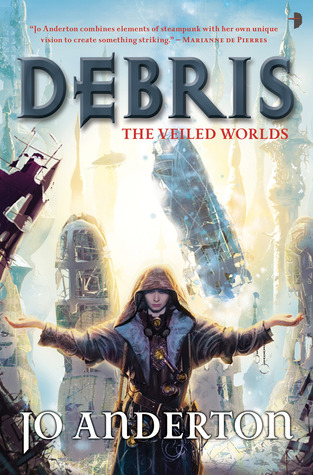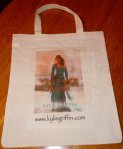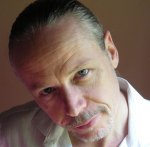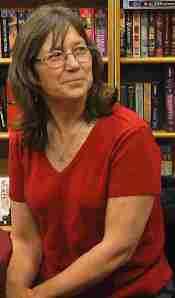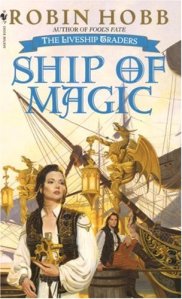As the next of my series featuring fantastic female fantasy authors (see disclaimer) I’ve invited the talented Kim Falconer to drop by.
Watch out for the give-away question at the end of the interview.

Thank you, Rowena, for inviting me here to chat. What a wonderful idea, fantastic female fantasy authors!
Q: In a post on Nicole Murphy’s blog, you talk about having a dream and realising your potential. Your dream was to be published. You list a series of questions starting with – Why do I want to be published? That culminated in the realisation that you wanted to ‘be of value’. This was a dream exercise from Jeanette Maw, the @goodvibecoach. Do you use exercises like this in your everyday life to understand what is motivating you?
Absolutely! I live by the old Delphi motto, (recently cited by the Oracle in The Matrix) Know Thyself. These are the two magic words for living an authentic life.
We always have a choice to either live by our ‘default’ – the cultural conditioning, expectations and assumptions – or to take time to really know our genuine core values (which may be wildly different than our cultures). Like writing a character in a book, when we know the motivation, we know what’s driving the action and when we know what’s driving the action, we know the destiny. At that point we can ask, is this what I want? If not, we can change course. We all have the power to be who we are and it begins always with know thyself.
 Q: Your first trilogy, Quantum Enchantment, you splice DNA and travel between parallel worlds. It seems to be a mix of SF and fantasy. And your second trilogy, Quantum Encryption, picks up the threads again. With such complex story lines and time lines do you have a huge flow chart to keep track of everyone?
Q: Your first trilogy, Quantum Enchantment, you splice DNA and travel between parallel worlds. It seems to be a mix of SF and fantasy. And your second trilogy, Quantum Encryption, picks up the threads again. With such complex story lines and time lines do you have a huge flow chart to keep track of everyone?
Much of my creation process takes place in my head but I do keep a little booklet for each series with pertinent data like my character’s sun signs and other relevant astrology, their histories (which may not appear in the book itself) and places, familiars, memories, dreams, appearance, and, most importantly, time lines. When you write time unfolding in both directions, it pays to keep a close watch on it or things can get away!
I ran into a bit of trouble in Arrows of Time, book #2 in the Quantum Enchantment series. For starters I found the English language lacked the words to express the meaning of symmetrical time (time flowing in both directions simultaneously). In a way Arrows was my answer to the hard problem of time at the ‘quantum’ level. It does go both ways and this books shows us what that might be like to live out.
You could say there was a flow chart for Arrows. For twelve months a whole sliding glass door next to my study was covered in it. Wild!
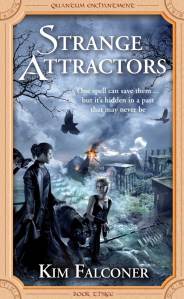 Q: In an interview on The Fringe you say: ‘People don’t realise writing is as challenging and complex as brain surgery. You have to work on the cadavers first, learn all the anatomy and physiology and bio-chem of prose and storytelling before you cut a live one! It takes practice. I mean, nonfiction is objective, intellectual but fiction asks for more. It asks for your whole heart.’ Writing from the heart, do you find yourself exploring similar themes in your books?
Q: In an interview on The Fringe you say: ‘People don’t realise writing is as challenging and complex as brain surgery. You have to work on the cadavers first, learn all the anatomy and physiology and bio-chem of prose and storytelling before you cut a live one! It takes practice. I mean, nonfiction is objective, intellectual but fiction asks for more. It asks for your whole heart.’ Writing from the heart, do you find yourself exploring similar themes in your books?
The themes in my books are multilayered. There is an adventure component which simply invites the reader to immerse and come along for the ride. There is also an intention to expand my readers’ consciousness through the experiences and conflicts they encounter. Some of the philosophies are heady, I am told. But the true essence of the books is the heart. Everything from the heart. I came from a nonfiction and academic publishing background and the whole enchantment for me in writing novels is to get out of my head and into my heart!
Q: You have your own astrology page, Falcon Astrology. You say astrology has always been a part of your life as your father used to ‘use horoscopes in conjunction with financial adventure and business management’. Your interest in astrology has 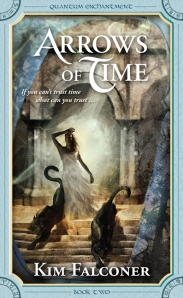 taken a different path. You say you are interested in ‘ancient wisdom, mythology with mystical traditions, art and poetry’ and are ‘ever seeking the hidden worlds of the inner self’. I read somewhere that the constant connection to the internet (people in offices dipping into social networks on and off all day, people constantly using their phones to keep up with social networks), has led people away from connecting with their inner-selves. They live on the surface, never delving deep. This person recommended turning off all electrical devices for a weekend, every now and then, just to take the time to be in the present. Do you do this?
taken a different path. You say you are interested in ‘ancient wisdom, mythology with mystical traditions, art and poetry’ and are ‘ever seeking the hidden worlds of the inner self’. I read somewhere that the constant connection to the internet (people in offices dipping into social networks on and off all day, people constantly using their phones to keep up with social networks), has led people away from connecting with their inner-selves. They live on the surface, never delving deep. This person recommended turning off all electrical devices for a weekend, every now and then, just to take the time to be in the present. Do you do this?
This is a good question. I don’t think superficiality and the internet are synonymous. I’m actually doing the Deepak Chopra Centre’s 21 day meditation challenge, and that of course, is online. It’s amazing. The meditations are wonderful and just knowing you are participating with hundreds of thousands of other mediators makes is quite a powerful collective exercise.
People will be connected or disconnected regardless of whether they have the internet or not. It’s a tool. It only matters how we use it.
For me, I’ve researched and written 7 books in four years and that’s pretty much an everyday dedication – me, a quiet room, my word processor, the internet. I do take time out daily to meditate, run on the beach, walk in nature, work on my rooftop garden and be with friends, familiars and family. It’s all about creating balance, at least in my case (I can be a real workaholic!)
Q: In an interview on Beauty and Lace, while talking about growing up in the 60s and 70s you said: ‘I had to outgrow my cultural conditioning and adopt less biased beliefs to feel fully empowered. Having my son at age 29 was a huge turning point. When you have the creative force of Mother Earth flowing through you, it’s hard to feel like an underdog. Seriously enlightening transformation!
Currently being female brings to mind the Strength card in the deck of Tarot. Do you know the one? A woman is depicted with a lion, Ishtar’s beast. It’s an image of power and seduction, wisdom and instinct. I think that sums things up nicely.
Being a woman has also given me quite an edge writing these last six books. There are issues of gender that ring all the more true because they are written from direct experience.’ I notice you have strong female characters in ‘Journey by Night’. Was this something you set out to explore or did it just evolve as you wrote the book?
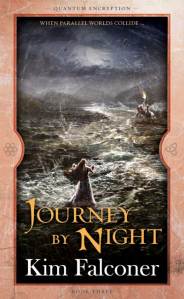 Journey by Night is the sixth and final book in the series and tells the story of Kreshkali and Nell, characters introduced in the very first book. Because of the incredible fortitude and strength of these two women already established, telling their story involved showing how they go that way, how they became the people readers know them to be. Already I have reports of a lot of tears and ah ha moments as some of those reasons behind their quirks, strengths, fears and magical inclinations are revealed. Very satisfying to read and write.
Journey by Night is the sixth and final book in the series and tells the story of Kreshkali and Nell, characters introduced in the very first book. Because of the incredible fortitude and strength of these two women already established, telling their story involved showing how they go that way, how they became the people readers know them to be. Already I have reports of a lot of tears and ah ha moments as some of those reasons behind their quirks, strengths, fears and magical inclinations are revealed. Very satisfying to read and write.
Did I plan them to be strong from the beginning? You bet!
I don’t know many women who really enjoy reading about victims that never find the wherewithal to beat their odds, at least, I don’t! My women are heroic, both vulnerable and hardened, smart and streetwise, loving and imaginative. . . you know. Women!
Q: The list of all the things you’ve studied is fascinating. ‘Alternative health, Jungian Psychology, art history, quantum physics theory, metaphysical philosophy, self-sufficiency farming, marine biology, veterinary nursing, dressage, animal husbandry, SCUBA diving, and nursing mothers counseling. I hold diplomas in herbal medicine, nutrition, vet nursing, farrier science, literature and am a board certified lactation consultant. I’ve also studied yoga, music (banjo, mandolin, guitar), mythology, tarot and of course, astrology’. You’ve been studying Iaido for seven years. I did five years Iaido. I loved it for the beauty of the movements and the philosophy behind it. Have you done other martial arts? (I also love yoga!).
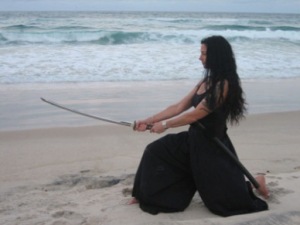
I love that you found Iaido relaxing. I can see how, once the incredible awkwardness of the samurai sword is a little under control, it can be that way. But I had true warrior woman sensei and she was anything but relaxing! Having said that, my worlds, she was good and what I learned went well beyond the mechanics of the practice. Like you said, the philosophy and the heart of the sword – so empowering and beautiful. I’ve done Aikido, Hop Kido, yoga, chi kung and archery. All very beautiful and centring disciplines. It’s the sword work that has supported my writing the most. I took it up so I could write authentic fight scenes!
Q: That’s a cool ‘time portal’ on the front page of your web page. Do you have a background in graphic design? (Reading on I discovered your son is an artist).
KimFalconer.com is a collaboration with my son. He’s the animator and graphic artist. I am the coder. I learned all the html/CSS in a socio-technology degree through Open University Australia (another point for the internet – the course was offered at Curtin University on the other side of the continent!) I love web design. Having such a fabulous artist is a wonderful bonus!

John Waterhouse - The Siren
Q: John Waterhouse Painting, The Siren inspired your new trilogy Amassia. It’s co-written with your cover artist/animator son, Aaron Briggs. (I love the Pre-Raphaelite artists and Waterhouse’s The Lady of Shalott is one of my all time favourites). I’ve discovered there are visual writers and aural writers. Aural writers like to play specific music while they write to get into the right frame of mind for each book. I’m guessing you are a visual writer?
Visual yes, but it’s more than that.
I’m really transcribing. The story plays out in front of my eyes. It’s like watching a film only I am fully immersed in all five senses. My only hope is that I can type fast enough to keep up with the action and the dialog!
I like silence and quietude. The more isolated I am, the more the inner world comes alive!
Q: I was prompted to start this series of interviews because there seems to be a perception in the US and the UK that fantasy is a bit of a boy’s club. Do you think there’s a difference in the way males and females write fantasy?
I would probably have to read a few thousand more books to answer that with any authority but with my experience, I can give you a firm, yes and no. Yes when we think of stories with first person protagonists like Charlaine Harris’ Sookie Stakchouse. A guy could write her (think of the men writing romance under pen names) but Charlaine’s perspective is very much a product of her society and very biased female. Just the way sookie stops to put on makeup (between vampire and were attacks), shave her legs and think about her sex life rings ‘female’. I don’t see Jim Butcher writing a woman that way. His Dresden, on the other hand, is American male. We see inside a man’s head, and it’s brilliant. (Same with China Mieville) In the case of these authors, you can feel the female vs. male style in the writing.
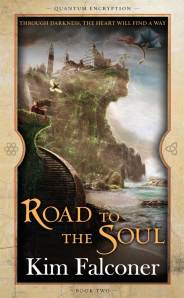 Then there are authors like David Eddings and Fiona McIntosh. They have both written fabulous fantasy tales and though there is a strong feeling of gender in the characters, you could swap author names and not know the difference in terms of being written by male or female.
Then there are authors like David Eddings and Fiona McIntosh. They have both written fabulous fantasy tales and though there is a strong feeling of gender in the characters, you could swap author names and not know the difference in terms of being written by male or female.
As in any genre, the author brings themselves to the work and that means every book will be different, a unique expression which adds to the whole of the field.
Q: Following on from that, does the gender of the writer change your expectations when you pick up their book?
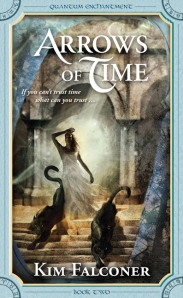 Ah, not until I begin to read. As I said above, sometimes the gender of the author seems relevant and sometimes not so much so. It depend a lot on the tense it’s written (first person and male by a male author gives us some hints right ways – we are in a guy’s head!). Stories that are more epic where the politics of the worlds drive the plot, the focus is off the characters, to some degree, and more on the stakes. With new authors, and familiar, I like to leave my expectations behind and let them surprise me.
Ah, not until I begin to read. As I said above, sometimes the gender of the author seems relevant and sometimes not so much so. It depend a lot on the tense it’s written (first person and male by a male author gives us some hints right ways – we are in a guy’s head!). Stories that are more epic where the politics of the worlds drive the plot, the focus is off the characters, to some degree, and more on the stakes. With new authors, and familiar, I like to leave my expectations behind and let them surprise me.
Q: And here’s the fun question. If you could book a trip on a time machine, where and when would you go, and why?
That’s easy. I would go back to 575 BCE to ancient Mesopotamia and stand in front of the Ishtar Gate of Babylon. To walk into that city under the Ishtar Lions and visit the hanging gardens would be a trip of a thousand life times!
Give-away Question:
If you were a young witch (male or female) training at Treeon Temple and about to meet your familiar – a creature you would be bonded with for life, in constant communion with and able at times to ‘trade places’ with, what would that creature be?
Follow Kim on Twitter: @KimFalconer
Catch up with Kim on Facebook.
See Kim’s Daily Astro Flash here.
Subscribe to Kim’s New Moon News Letter.
 Rebecca has generously offered a Give-away book bundle of:
Rebecca has generously offered a Give-away book bundle of: is the winner. Thank you so much for the chance to participate. Please let me know where to send the prize.
is the winner. Thank you so much for the chance to participate. Please let me know where to send the prize.










